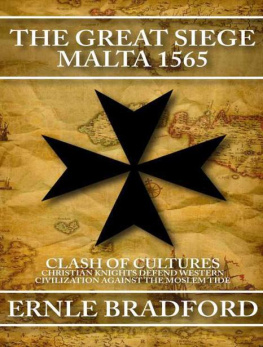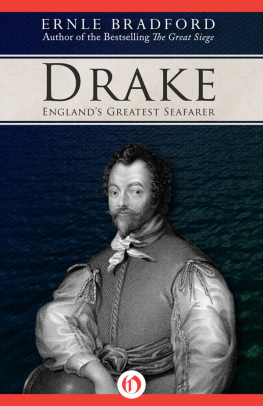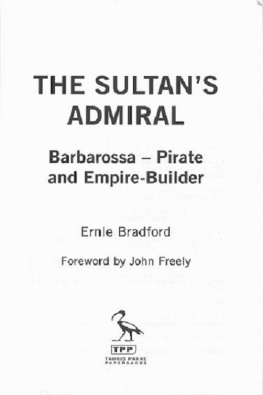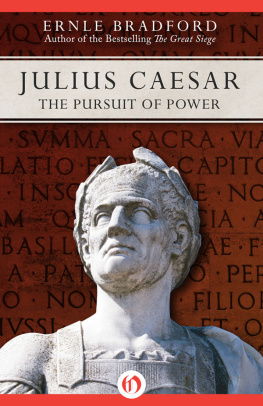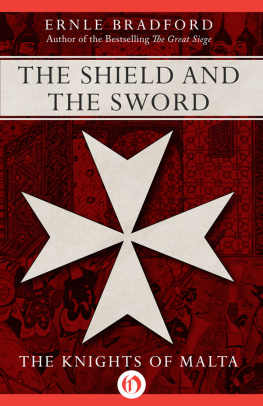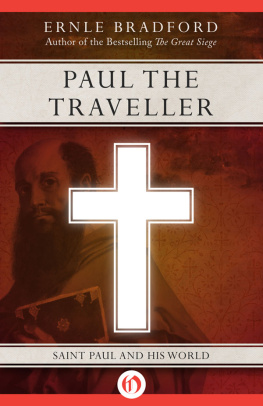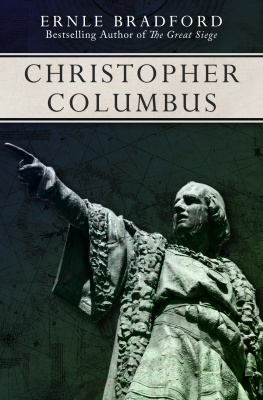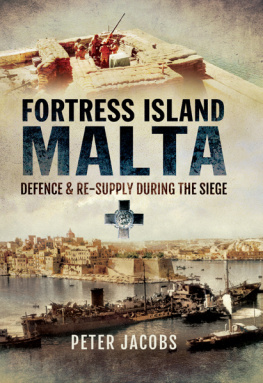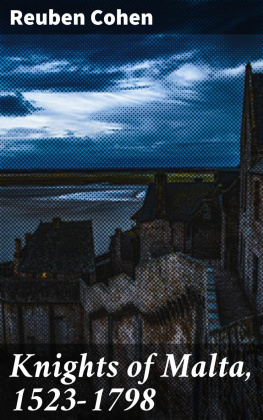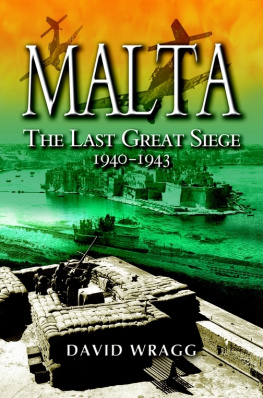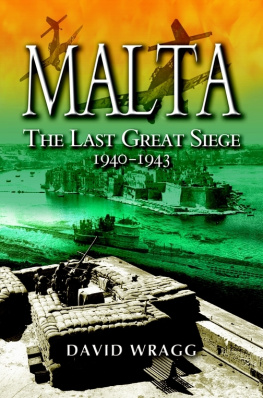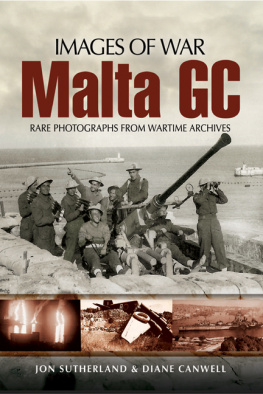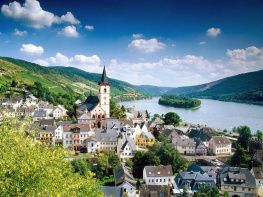
Table of Contents
Foreword
I first came to Malta in 1942, at a time when the island was enduring the second great siege in its history. I was then a naval officer, the navigator of a destroyer, and too busy to care about the islands past, or that other great siege which had preceded the one in which I was involved, by nearly four centuries. In 1943 I revisited Malta during the invasion of Sicily. It was then that I saw the island fulfilling the role which Soleyman the Magnificent had envisaged for it in 1565. From Malta, the Allied Forces stormed and captured Sicily and Italy.
I returned to Malta in 1951, this time at the helm of my own small sailing yacht. I now had the leisure to learn something about Maltas history, and about her first great siege. I was fortunate that Captain John Tothill, D.S.C., Royal Navy, was at that time Captain of Fort St Angelo. It was he who kindly allowed me to berth my boat in the small harbour that lies behind the fortress. For five months I lived in that narrow stretch of water which was once the moat separating St Angelo from the village of Birgu. It was here that the galleys of the Order were moored during the great siege.
During that time I grew to know every detail of the fortress, its bastions, its chapel, and its Council Chamber; as well as those long tunnels and caves beneath it, where the galley-slaves were formerly incarcerated. I did my daily shopping in the narrow streets and alleys of what is now called Vittoriosa, The Victorious City, but which is still Birgu to the Malteseas it has been for centuries. I visited all the places which had figured in the great siege of 1565. It seemed to me at times more real, and vivid even, than that second siege of only a few years ago.
Since then I have revisited Malta many timesin spring, summer, autumn, and winter. I have lived in several parts of the island, and have sailed all round the small archipelago. I have grown to know and respect its people. Without their kindness and assistance I would have found it difficult, if not impossible, to undertake this book.
The Great Siege of Malta was one of the decisive actions in the history of the Mediterraneanindeed, of the Western World. Nothing is better known than the siege of Malta, remarked Voltaire. The fact remains that very little has been written on the subject in Englishand this, notwithstanding that the island was confirmed a British possession as long ago as 1814. This lack of interest on the part of English-speaking historians may perhaps be traced to the fact that the English Langue of the Order of the Knights of St John had been dissolved several years before the siege took place. Certainly the bibliography is extensive in French, Italian, and Spanish. I have indicated at the end of this book the principal sources upon which I have drawn. I would in no way pretend that this is anything approaching a complete bibliography. The late Major H. E. Balbi, M.B.E., was collecting material for such a bibliography at the time of his death. It remains for some other student or research historian to complete his work.
In the recent past, Malta and its remarkable history have tended to be somewhat neglectedperhaps because the islands name has been automatically associated with a naval and military garrison. It is noteworthy that it is only within the last ten years that the first comprehensive work on its architecture has been published: architecture which in many respects is more deserving of attention than that of many better known, and publicized, islands of the Mediterranean.
It is to be hoped that Malta has now withstood its last siege. With the current change in its statusfrom a fortified castle, as it were, to a country residenceit is likely that many historians, students, and art lovers will visit this remarkable small island. For Malta, as the traveller Patrick Brydone wrote to William Beckford in 1773, is the epitome of all Europe.
Maltese is a difficult language to read. For this reason I have not been logical in my orthography. I have, for instance, referred throughout to the main southern harbour of the island as Marsasirocco (the Italian place name) rather than Marsaxlokk. Similarly I have used the name Marsamuscetto for the large harbour to the north side of Valetta, rather than Marsamxett.
Malta, in fact, had no written language or dictionary even, until the nineteenth century, when the Roman alphabet was adopted. The language which is Semitic by origin, stemming possibly from the Phoenician, does not easily lend itself to this system. I have referred throughout to the ancient capital of Malta by its Maltese name Mdina, rather than Citt Notabile (as it was known to the Knights). The name Mdina undoubtedly derives from the ArabicMedine or El-Medina (The City). The second main peninsula of Grand Harbour I have called Senglea, rather than LIslathe name the Maltese have always given it. The village of Senglea was founded by Grand Master Claude de la Sengle (15537). On the other hand, where no English or Italian equivalent exists, I have kept the modern Maltese spelling of place names, such as Ghain Tuffieha (the Gh is silent). Translated literally it means: The Fountain of the Apples.
For assistance and encouragement at various times, and over a number of years, I would like to express my thanks to many people: Sir Hannibal Scicluna, M.B.E., who first allowed me to consult his unique library in 1951; to the Malta Government Tourist Bureau, and the Director of Public Works; and to The Hon. Dr L. Galea, C.B.E., Q.C., for his assistance in the early stages of my research. I would like to record my particular thanks to Dr Vincent DePasquale, Librarian of the Royal Malta Library, for all his kindness and help over many months, also to Mr Joseph Galea and Mr E. R. Leopardi. I owe an incalculable debt to Dr Joseph Spiteri, LL.D., who, in many conversations, has enlightened me on aspects of Maltese custom, legend, folklore, and language. I also owe a debt of thanks to the Librarians of the Garrison Library, Malta, and the British Council Library.
I dedicate this book to the memory of my father, Major Jocelyn Ernle Sidney Patton Bradford, M.B.E., M.C.
E.B.
St Pauls Bay, Malta
16 April 1961
De dehors on lui cria; des remparts on rpondit. Malte dor, Malte dargent, Malte de mtal prcieux, Malte, nous ne te prendrons pas, mme si tu ntais que courge, mme si tu ntais protge que de peau doignon.
Je suis celle qui a dcim les galres du Turc, tous les braves de Constantinople et de Galata.
From a sixteenth-century Cypriot ballad, translated by Hubert Pernot
Chapter 1
The Sultan of the Ottomans
Soleymans titles resounded through the high Council chamber like a roll of drums:
Sultan of the Ottomans, Allahs deputy on Earth, Lord of the Lords of this World, Possessor of Mens Necks, King of Believers and Unbelievers, King of Kings, Emperor of the East and West, Emperor of the Chakans of Great Authority, Prince and Lord of the most happy Constellation, Majestic Caesar, Seal of Victory, Refuge of all the People in the whole World, the Shadow of the Almighty dispensing Quiet in the Earth.
His ministers, admirals, and generals prostrated themselves and withdrew. It was the year 1564, and Soleyman the First, Sultan of Turkey, was seventy years old. He had just taken the decision to attack the island of Malta in the spring of the following year.
His had been a life of unparalleled distinction from the moment when he had succeeded his father, Selim, at the age of twenty-six. Known in his own country as the Lawgiver, and throughout Europe as Soleyman the Magnificent, he had truly earned these appellations. He had reformed and improved the government and administration of Turkey, and had made her the greatest military state in the world. He was unequalled as a statesman, and was a poet in his own right.
Next page
